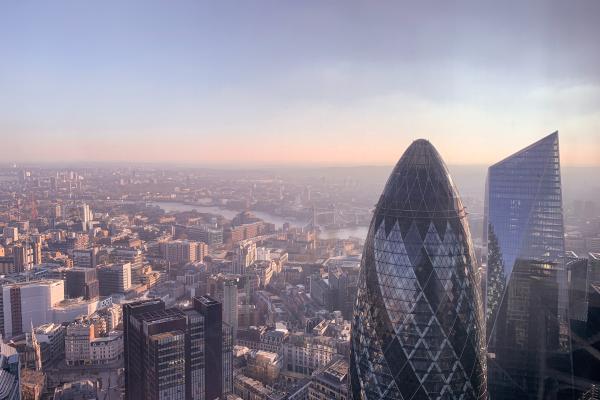Decarbonising the world is the defining resilience challenge of the early 21st century. The UK is the fastest decarbonising of the G7 countries with 50% of electricity in the UK last year generated by low carbon sources.
70% of carbon emissions come from urban populations. How will the UK achieve this decarbonisation and how do you make already green city regions like Greater Manchester even greener? There are real challenges for cities in decarbonising during the coming years in areas which are using high levels of energy, such as: housing stock (new and retrofitting), heavy industry, the move to a hydrogen economy and transport hubs.
The population of Greater Manchester is predicted to grow by 10% over the next 20 years. This equates to 190,000 - 240,000 more people living in the city-region which will require around 179,000 new homes by 2037. Over and above this increase in demand on energy provisions and the city’s infrastructure, this growth is also expected to create up to 100,000 new jobs by 2037.
What does urban growth currently look like
Given the scale of growth required in the next 15 years Greater Manchester will need to attract a level of investment that will support these changes, e.g. to housing, services, and transport.
Greater Manchester is already doing a lot which can reassure investors. Indeed, Greater Manchester has done well in attracting investment since the1996 bombing in Manchester City centre and there are lots of examples of regeneration in the region, including within Salford with the example of Media City at the redevelopment of the docks.
Greater Manchester has vision and strategy and the ten local authorities in the city region form the Greater Manchester Combined Authority (GMCA) which already has its own Infrastructure Board and Infrastructure Strategy and Framework and has its own Transport Strategy and Five-Year Environment Plan. It already works closely with agencies and utilities and can build on these relationships. There are some challenges in the need to co-ordinate the programmes of each of these agencies and utilities in planning infrastructure, but GMCA can facilitate the convening of people.
GMCA also has a Spatial Plan setting out the scheme for working with the public on the use of land for housing and industry in the coming 15 or more years.
There are huge opportunities for growth and to develop new skills and a low carbon and green economy. In the energy sector alone, for example, 400,000 new net zero jobs will be needed in the UK, 120,000 in this decade alone. Locally, the University of Manchester has increased the number of engineers it is putting out in response to this.
What is the social value that can be gained from this growth?
Greater Manchester has been placing a focus on social value. In the city of Salford, the City Council is revising its Local Plan – the statutory framework for developers. The theme of that is social value and social investment. Economic growth needs to link to employment and to issues around work poverty, such as low pay. In Greater Manchester there is a need to maximise the impact of the Greater Manchester pound, i.e. keeping the money being generated from growth in the local area benefiting local jobs, local people, and the local Greater Manchester economy.
What are the resilience challenges?
The issue of viability in development comes up a lot in development planning. Developers can’t fund everything – greening schemes, affordable housing, open spaces, etc. - and often this is a barrier to progress. Funding from central government on brownfield has helped but other sources of funding are needed too.
Local authority cuts don’t help – many local authorities have had a reduction in government grant of around 50% since 2011. With this backdrop, where will the resource come from to enable more to be done, for example on social value? Many organisations talk about social benefits, but the resources are needed for measuring impacts and benefits and for holding people to account when there is a failure to deliver.
There is also a challenge in bringing government on-board with Greater Manchester and getting help to do things differently – a need to empower more locally and less centrally. Current central government focus is on growth but there is no mention of local approach and foresight or contribution from local government.
What more needs to be done?
GMCA is important in bringing the public sector and agencies together. There is a history of long-standing collaboration and partnership in the region. The Greater Manchester experience is that collaboration and networks are important. Working with central government is easier when there is strong local collaboration. It is better for investors, too, it shows stability, and that Greater Manchester has a plan and a collective vision.
Relationships, trust and investing time in building relationships between public and private sectors, in addition to voluntary can really pay off. In a single economic region, how sectors work together is important – the key is to focus on people and be willing to work with others to get things done.
In the current climate, it is incumbent on all of us to cut costs. But if you go short term, it will cost more. A longer-term planning approach is needed, particularly around regulation and planning policy. We still tend to work on a first come, first served basis and we do need to change.
The input of local government and city authorities is critical for change and regeneration, for example of the role of the city council in the creation of a media city in Salford. Local authorities can set up governance arrangements to encourage this kind of regeneration and growth, and local authorities need to monitor and manage the benefits coming through and hold others to account when there is a failure to deliver.
Upskilling needs to involve people from local communities, and a level playing field is important so all can benefit. This needs to include sub-contractors, intermediaries, and the supply chain too. It is important that we resource and invest in local communities and develop skills in local businesses.
If the experience in Greater Manchester is anything to go by, growth is possible but optimum growth will be sustainable and resilient.
Resilience First is grateful for contributions from Clive Memmott, CEO, Greater Manchester Chamber of Commerce; Mayor Paul Dennett, Mayor of Salford & Deputy Mayor of Greater Manchester; David Wright, Chief Engineer, National Grid



